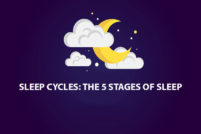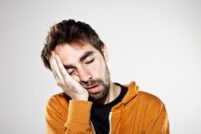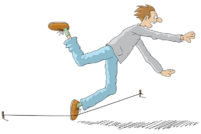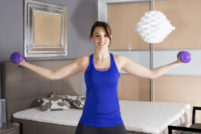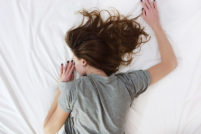You’re not alone: Each night millions of adults in the U.S. experience difficulty falling asleep or staying asleep. [1]
Consequently, we are plagued by fatigue, mood swings, and lack of concentration which interferes with our work and personal lives.
Don’t worry; we’re here to help: Here are 30 scientifically proven ways to help you fall asleep faster!
From the moment you wake up in the morning to climbing under the covers at night, use these tips to create the perfect conditions to fall asleep quickly.
During The Day
1. Make Your Bed
A poll conducted by the National Sleep Foundation found that those who regularly make their bed in the morning were more likely to report they had a good night’s sleep every day or almost every day (44% vs. 37%). [2]
2. Exercise
Beyond simply making you feel tired, when performed at the right time of day exercise can help accentuate the natural changes in body temperature which occur as part of your circadian rhythms and signal nighttime. [3]
3. Don’t Nap for Too Long
While a short nap may be just what was needed to restore your mental clarity and stave off fatigue, napping for too long or too late in the day can interfere with your ability to fall asleep at night. [4]
4. Limit Caffeine Intake
Caffeine has an effect on us far longer than most of us realize: 20 hours after consuming your cappuccino, 12.5% of the caffeine is still active. [5]
It’s thus important to avoid caffeine post lunch-hour.
5. Get Lots Of Sunshine
Our circadian rhythms depend on stimulation from sunlight during the day to remain in sync with a day-night schedule. A lack thereof can lead to circadian rhythm disorders and insomnia.
In The Evening
6. Warm Shower or Bath
Heat up your body with a warm shower or bath; the subsequent cool-down will mimic the natural dip in body temperature which occurs at bedtime, facilitating sleep. [7]
7. Drink A Hot Beverage
For the same reasoning, drinking a hot (non-caffeinated) beverage can help achieve the same “warm you up to cool you down” effect.
8. Immerse Face In Cold Water
If you’re feeling stressed and anxious in the evening, try resetting your nervous system by immersing your face in ice cold water for 30 seconds.
The cold water will activate your mammalian dive reflex, lowering your heart rate and blood pressure. [8]
9. Eat Light
You should avoid eating too close to bedtime, as digestion can blood sugar levels can interfere with your sleep. It’s also recommended to eat a light meal at supper time, and avoid foods that are hard to digest. [9]
10. Avoid Alcohol
While alcohol may help you fall asleep quickly, you are far more likely to experience interrupted sleep and wake up feeling unrefreshed. [10]
11. Dim The Lights
While during the day you want to receive light stimulation, as bedtime approaches you want to avoid this so as not to send conflicting signals to your body clock about the time of day.
12. Limit Use Of Electronic Devices
The blue light emitted by electronic devices and energy-efficient light bulbs has been proven to delay the release of melatonin — a hormone which signals nighttime and is integral to the sleep-wake cycle.
13. Drink Cherry Juice
Tart cherry juice is one of the natural sources highest in melatonin — a hormone which signals darkness, telling the body it’s time to sleep.
Having a glass 2 hours before bed, when melatonin levels naturally begin to rise, can help you feel sleepier. [11]
14. One Hour “Wind Down” Time
As your melatonin levels begin to rise, and you start to feel sleepy, listen to the signals your body is sending you and start winding down for the day. Put away your work, forego any strenuous activities and focus on relaxing.
15. Don’t Get Into Bed Until Sleepy
You should reserve your bed for sleep. Much of falling asleep quickly is about forming proper habits: by partaking in other activities once you’ve tucked yourself in, you’re creating unintentional associations between this space and being awake.
While In Bed
16. Keep Cool
The optimal room temperature for sleep is between 60-67 degrees Fahrenheit, anything warmer conflicts with our body’s natural drop in temperature during the night, interrupting sleep.
17. Wear Socks
While keeping cool is important, if your feet and hands get too cold this will disrupt sleep or make falling asleep difficult. Keeping a hot water bottle near your feet or wearing socks will help your internal temperature reach its ideal setting more easily.
18. Use A White Noise Machine
White noise machines help to drown out noises that may be keeping you up at night. These devices work by reducing the difference between the ambient noise and any “peak” noise — such as a toilet flushing.
19. Eliminate Light
Following the desired pattern of our internal clock, it’s now best to eliminate any light stimulus to signal to your body that night has fallen, and it’s time to sleep.
20. Hide Your Clock
Being constantly reminded of the time — and the hours remaining before you have to get up in the morning — only adds to your stress and anxiety. Hide your clock and avoid checking the time on your smartphone.
21. Change Your Sleep Position
It’s important to take care of your posture, even when sleeping. Ensure that your body is adequately supported for the position you are lying in to avoid cramping or discomfort.
Additionally, if indigestion is keeping you up, it’s recommended that you sleep on your side. A natural latex foam mattress is fantastic for side sleepers, and keeps your spine aligned at night.
22. Wear Comfortable Clothing
If you don’t enjoy sleeping in the buff, make sure you choose natural fabrics that do not trap air against the body. Similarly, dressing in too many thick layers will prevent your body from reaching its preferred sleeping temperature.
23. Listen To Music
Listening to music can help you relax and fall asleep faster; however, your choice of music is integral to the effect. Pick something you find soothing and that creates a relaxing atmosphere.
24. Progressive Relaxation
The National Sleep Foundation recommends progressive muscle relaxation as a means to induce sleep.
Begin to tense and relax your muscles, starting with your toes and working your way up to your head.
Tense for 5 seconds and relax for thirty seconds. [13]
25. 4-7-8 Method
4-7-8 is a breathing technique popularized by Dr. Andrew Weil, and is said to help you fall asleep in under one minute.
Simply follow these steps, repeating for a total of 4 breaths:
- Place tip of your tongue against the ridge of tissue behind your upper front teeth. Maintain this position for the entire exercise.
- Exhale completely through your mouth, making a whooshing sound.Inhale through your nose for a count of 4.
- Hold your breath for a count of 7.
- Exhale through your mouth, making a whooshing sound, to the count of 8.
26. Meditate
Meditation is a tried and true way to relieve stress and relax your body and mind. Research has proven that meditation is an effective tool in treating insomnia. [14]
27. Use Aromatherapy
Many scents have a proven relaxing effect on the body, including sandalwood, vanilla, and marjoram. Lavender is perhaps the king of scents when it comes to sleep, with studies demonstrating significant improvements in quality and length of sleep. [15]
28. Try NOT To Fall Asleep
Studies have shown that reverse psychology can be helpful for sleep-onset insomniacs: setting the paradoxical intention of staying awake helped participants fall asleep faster.
29. Visualization
When negative thoughts and ruminations interfere with falling asleep, visualization can help redirect your mind promote relaxation.
You can practice this independently, or use a guided visualization podcast or youtube video.
30. Acupressure
Acupressure involves pressing on particular points on the body which are believed to have specific effects on our physiology and mind.
Faculty at the leading natural health University, Bastyr University, recommend these acupressure points to relieve sleeplessness: [16]
- Between the eyebrows
- Between first and second toe
- Massage your ears for 1 minute
Here’s one bonus tip if all else fails:
31. Do Something Else For 10 Minutes
If you are unable to fall asleep within 15 minutes, get out of bed and perform an activity you find relaxing.
Experts recommend choosing something that requires you to use both your head and your hands, such as a jigsaw puzzle or a coloring book.
The trick is to not associate your bed with being awake.

